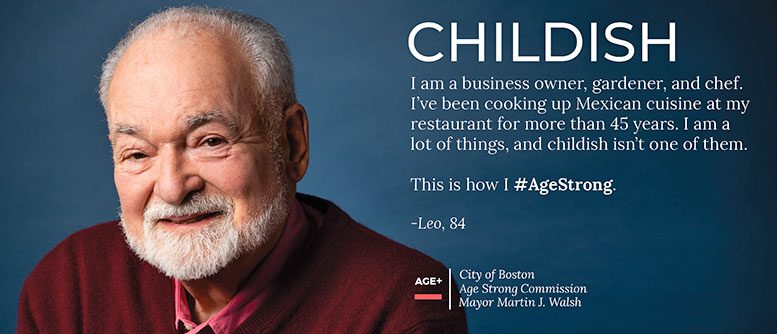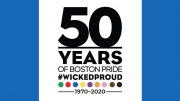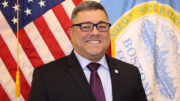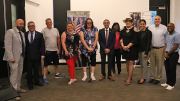Age Strong showcases elderly Bostonians to break up stereotypes; Fights Ageism
By: Chris Gilmore/TRT Reporter—
BOSTON—Late in September, Boston Mayor Marty J. Walsh announced the launch of the first Age Strong Commission public awareness campaign, according to Commission officers.
The Age Strong Commission, previously known and launched in early 2019 as the Commission on Affairs of the Elderly, aims to purposely educate others and bring resources to elderly Bostonians as part of a national movement to be more inclusive, accessible and language-and-action positive to older adults living in the city.
“In Boston, we are committed to lifting up the stories of our residents, who have contributed so much to our communities,” said Mayor Walsh. “With our ageism work, we aim to create a more compassionate, more inclusive society where everyone has the support they need to live a fulfilling life.”
The Age Strong Commission “reflects the City’s efforts to make Boston inclusive, accessible and positive for people as they age,” according to the City of Boston’s commission’s initiative website.
Elderly adult lives shared publicly
The campaign showcases eight older Bostonians who “defy negative stereotypes about aging.” Through the use of advertisements, they defy labels that are often used against the elderly such as “frumpy, cranky, inactive, senile, frail, childish, over the hill, and helpless.” Their lives’ stories about resiliency directly challenge those biases.
“Our goal is to help older adults be recognized for their experiences and contributions to Boston,” said Age Strong Commissioner Emily Shea to The Rainbow Times via e-mail. “This multifaceted campaign addresses implicit biases about older adults. The goal is to dispel stereotypes and replace the conversation about aging with positive messaging.
“Their photos are paired with their stories, and together, challenge the labels society places on them. They all feel a sense of pride and ownership of their age and life experience—they Age Strong. They serve as examples of how older residents should be treated.”
The advertisements will be featured across the city on bus shelters, in Boston Public Library locations, in a 30-second television commercial, and on digital signage through this fall.
“This campaign is groundbreaking! Kudos to the Age Strong Commission for presenting bold, vivid, dynamic individuals to challenge our culture’s (mis) representation of what being ‘old’ means,” said Lisa Krinsky, Director, Fenway Institute’s LGBT Aging Project. “I think these ads will surprise viewers and open their hearts and minds toward older adults—seeing them as examples of positive aging.”
LGBTQ & Intersectional Inclusion
The city’s efforts to portray the seniors are also racially and ethnically inclusive—including members of the LGBTQ community too.
“Our Age Strong team recognizes Boston’s aging LGBTQ community as a group to target to make sure that they have access to our services and programs because LGBTQ older adults are a part of a vulnerable population,” explained Shea.
Aware of the inclusion of LGBT elderly adults, Krinsky concurred.
“One of the people profiled identifies himself as a LGBT activist (among other things) and though the others don’t address LGBT issues directly, they represent a diverse and inclusive group of Boston residents,” Krinsky noted.
Although there are no current or “out” transgender elderly in the Commission, they are committed to full representation, according to their Commissioner.
“We are committed to better represent all Bostonians, as we all experience aging. Our main objective is to break down stereotypes, including for transgender residents,” Shea explained. “We welcome the transgender community to engage with the campaign and share their #AgeStrong story on social media. All of our events, resources, and programs are intended to uplift older Bostonians. Our team is focused on providing inclusive and equitable resources, events, and social engagement opportunities for all LGBTQ older adults, and especially those most vulnerable including members of the transgender communities of color.”
LGBTQ Latinx
Enter José Leopoldo Romero, Jr., or Leo as he is commonly known by many. Leo, a former U.S. Veteran who was contacted by the Commission for the campaign, is a restaurant chef-owner of “the most authentic Mexican restaurant in New England” called Casa Romero in the Back Bay. Leo thought it was important to participate because he wanted to “do what he does for as long” as he can.
“Keeping active while you age is the best way to survive,” he said. “I hope that all of us who participated in the [campaign] will be an inspiration to elders to continue their lives as long as possible and as enjoyable as always.”
Research partners
Partnering with the FrameWorks Institute—the research partner for the Reframing Age Project—the Commission, under Mayor Walsh, uses the partners’ services to confidently address the needs and realities of the aging population.
“Right now, aging simply isn’t an issue Americans are thinking about as a matter that requires a public response,” reads the Framing Strategies to Advance Aging and Address Ageism as Policy Issues’ Brief (2017; page 1). “This reality reveals a serious risk of policy inertia, or worse, rollbacks of existing supports. Unless the field of advocates who care about aging issues cultivates a more visible, more informed conversation on older people, it will remain difficult to advance the systemic changes needed to adjust to a society with increased and increasing longevity.
“To change this dynamic, the field of aging needs to advance a set of core ideas that creates the shifts in public understanding essential to building the political will to create a more age-integrated society.”
The Commission’s Age-Friendly action planning has resulted in successful launches of the City’s first pilot Senior Civic Academy; an interactive public restrooms map; age- and dementia-friendly business designations and an Employment Guide for people over 50; and a front-facing City staff training to educate employees on the needs of older people in Boston.
Businesses who are eligible for the age- and dementia-friendly designation are ones that have taken steps such as ensuring they have respectful and patient staff, providing resting areas and non-slip flooring and using universal symbols, such as arrows.
Looking ahead
Krinsky hopes that the Commission will continue to include the LGBT community as it has currently.
“This campaign directly challenges the ageism that is embedded in our broader culture and pervasive within the LGBT community,” she said. “I hope the Age Strong Commission will continue this campaign in the future and use future opportunities to be inclusive again of the LGBT community.
“Both the Age Strong Commission and the City of Boston have been strong allies for LGBT older adults in Boston for many years by funding community cafes for LGBT older adults, providing LGBT cultural competency training, actively supporting and participating in Pride events for LGBT older adults, and incorporating LGBT older adults into many of their community programs. Looking forward, it is time that Boston becomes home to LGBT friendly senior housing—enabling LGBT older adults to live and thrive together in a safe and respectful community.”
Leo also praised the Commission for its work.
“I am very much impressed by the stamina and creativity of all my colleagues in this project, and applaud the Age Strong Commission for all they are doing to inspire all elders to be Age Strong,” said Leo, one of the models for the Age Strong Campaign.
To learn more about the Age Strong Commission and Awareness Campaign visit https://bit.ly/2Nd0R0j. Learn more about Age- and Dementia-friendly Certified businesses here: https://bit.ly/329T87h. To become an age-friendly business click here.







